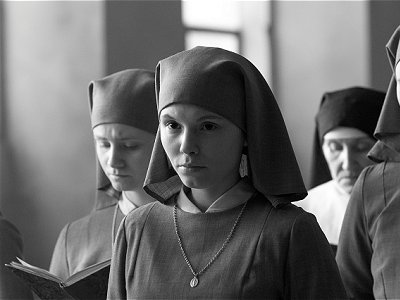
IN PRAISE OF UNDERSTATEMENT
A gem of a Polish film affords us the space to reflect on life and faith without being told what to think
To visit the cinema today to find something to watch is to subject yourself either to a nerve-shredding, ear-splitting epic of special effects and endless violence or a garish, gross-out comedy of eye-opening crudeness; anything else is deemed ‘indie’, as if there is something not quite normal about the film. At least this is how to feels.
What would cinema look like if another nation dominated the screen in the way American Hollywood has? The Polish film Ida, set in 1962,gives a clue. Its themes are rooted in historical reality yet have a panoramic sense of meaning and identity, tragedy and hope. A young orphan called Anna is raised by nuns and is on the verge of taking vows herself when the sisters decide she should first learn more of her background before taking this step.
She is sent to meet her one surviving relative, an aunt, who is a hard-bitten, world weary former communist prosecutor with a record of repressing so-called counter-revolutionaries. Anna learns that she is Jewish. She and her aunt embark on a journey to uncover the truth about her parents. They discover her mother and father were murdered by an opportunistic Polish antisemite who then appropriates their home for his own family. The murderer shows them where the bodies were summarily laid and the remains are disinterred to afford a dignified burial.
In the course of this disturbing journey, Anna meets a charming young jazz musician who seems to win her heart. The film ends with both Anna and her aunt arriving at radically different views on their own futures.
The story is beautifully told in a succinct style. There is an alluring simplicity which sustains interest, despite the lack of action. Characters are slow to speak, the camera lingering on faces which give little away. Nothing is revealed of inner thought processes; everything is stripped back. What does Anna think when she realises her Catholicism is expressed in a Jewish body? How does she feel about the man who murdered her parents? What kind of faith and logic leads her to make the defining decision of her life at the film’s end? We are kept guessing, but encouraged to imagine.
The film is so true to its era that we could be forgiven for thinking it was made in the early 1960s, rather than being the Oscar winner for Best Foreign Film in 2015. In an un-heroic western culture drenched in over-statement, where no thought is left unspoken and every motive is explained, where each moment is captured on camera and shared with others instantly, it is hard to settle to the gentle rhythms of slow cinema. But the rewards of doing so are manifold.
There is something biblical about Ida that goes beyond its themes of identity, faith, guilt and forgiveness. Like the sparing and laconic prose of the Gospel historians, the determination not to spell everything out affords space for curiosity and faith. We are not being told what to think, but invited to imagine stories and make a response to them which alters the way we think about our place in this world.
POPULAR ARTICLES

Why Violence Is Declining In The West But There Is No Guarantee It Will ContinueTo
Europe's peace since 1945 could yet be seen as a brief interlude.

Obama's Covert Wars
The use of drones is going to change warfare out of all recognition in the next decades.

Through A Glass Starkly
Images of traumatic incidents caught on mobile phone can be put to remarkable effect.
They can also be filmed as a way of avoiding a personal response to the incident.

What Are British Values?
Is there a British identity and if so, what has shaped the values and institutions that form it?

